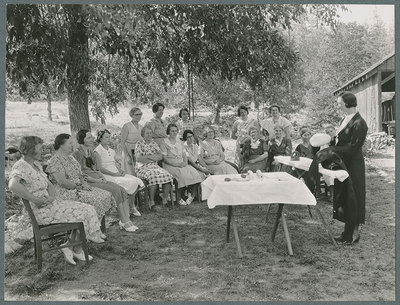Women were not only an essential component of the student body in these early years, but served as faculty and staff members as well. The faculty roster for the first academic year (1866/1867) included two men and three women. Miss Frankie Hamilton was in charge of the Primary Department, and Misses H.F. Stevens and Fannie Mulkey were in charge of music. In spite of her recent marriage, Fannie – by then Fannie Armstrong - stayed on as Head of Music for the 1867-1868 school year. She would continue in that position until replaced by “Master” Jacob Brenner in 1870. That same year Rev W.A. Finley was replaced as the head of the Young Ladies Boarding House by Mrs. Crabtree, wife of a Board of Trustees member.
In later years, the women employed by the Extension Services served a critical role in small, rural communities throughout Oregon, not only supporting these communities, but also linking residents to students, scholars, and staff on the main campus. They were vital to the success of the Land Grant mission, fulfilling the mandate of the Extension Service to carry “facts and other authoritative scientific information directly to the people,” so that “no county, town, hamlet, farm or home need be without some benefit of this service.”
Women worked as Extension Agents in all of Oregon’s thirty-six counties in a variety of important ways. Home demonstration agents provided hands-on tutorials on topics such as home canning, fabric care, and the tasteful integration of soy products in meals. Extension specialists provided educational offerings on everything farm crops and nutrition, to “community social organization,” to raising or caring for livestock. They continue to do similar work today, with classes on food preservation, rural living, and family health; however, their broadening focus shows the changing roles and needs of women. There is a Women’s Farmer Network, a Women in Sustainable Agriculture discussion group, and a League of Women Welders, as well as women-only classes on chainsaw sharpening and tractor maintenance. More general well-being classes include understanding LGBTQ+Identities, healthy aging, strength training, leadership skills, parenting education, and food safety tips for pregnant women. And, of course, families continue to participate in 4-H activities.
For most of the college’s history, women have also played important roles in supporting student, faculty, and staff communities. In both past and present, they worked as food service workers, house matrons, clerical staff, and librarians – all traditionally female professions. They also formed important campus community groups such as the President’s Commission on the Status of Women and Faculty Women’s Network, but also as members and advisors for groups like the Society of Women Engineers, Physicists for Inclusion in Science, Women in Leadership, Divine (all-female a cappella group), and various sports clubs.

